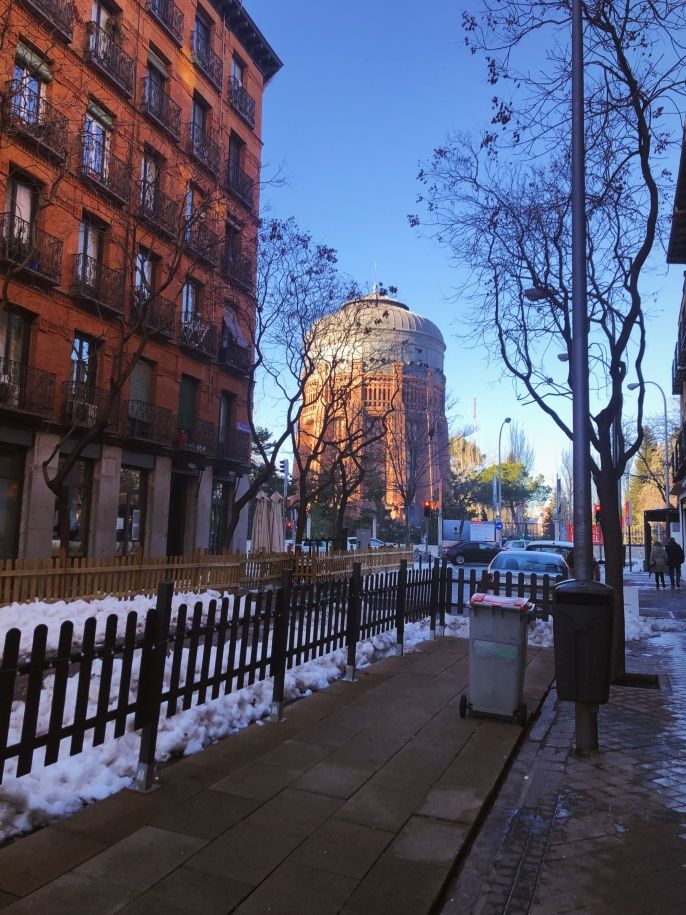Chaos Theory - Our first weeks in Madrid
We were entering the last 1000 feet of airspace before descending into Madrid’s airport. Normally, as we near the airport at midday, a favorite pastime of mine would be to see Spain’s countryside pass by thousands of feet under our feet. But today, the cloud covering held low. When it broke, we were greeted with a white dusting of falling snow. As a girl from Texas, all I could be was giddy at seeing these seemingly calm little flurries cover all of the capital. La Filomena. The storm that was taking over much of western Europe and all of the Iberian peninsula.

When I entered the country on the 7th, I was still reeling from events that had taken place the day before in my home country of the U.S. The snow, in many ways, felt lighthearted compared to the chaos I had just left hours before. Little did we know that the snow would not let up for the next two days. And once the snow had stopped its fall, we would be greeted by constant nightly freezes with temperatures barely over 2o C at midday.
There is only one word to describe my experience beginning in Spain so far: chaos.
This leads me to my first question: How do we make sense of it all when the world is in chaos? How do you start a new life in chaos?
For those of you mathematics- or physics-inclined, you may be aware of something called chaos theory. I am not; my education in physics stopped squarely at second semester college Physics I. But I’ll do my best to explain what it is.
Chaos theory: “The idea that chaotic systems magnify even the tiniest changes in the component parts of that system.” [i]
In other words, even small changes in the system can result in vastly different deterministic, rather than random, results.
When first learning about chaos, a common example is predicting the weather. Though we can do our best at estimates in the short term, the further and further we get from the point of origin with known variables, the further and further we get from precision in our predictions. With small errors or discrepancies in our starting data, we get vastly different, deterministic predictions.
So why do I bring up the idea of chaos? Because our personal worlds [GG1] are always changing, tumultuous and even best laid plans get further and further from what will come to actually pass.
I am so glad I planned and prepared for this move to Spain, for the adventure of being an Auxiliare in Madrid. I realized that taking the time to research and secure an apartment or remembering a laptop with a functioning camera for my first virtual class is vital to avoiding chaos.
But I could never have planned for being stuck with two amazing women for three days while we waited for the rest of the cohort to trickle in, finding what I hope will be lifelong friends. I could never have planned that two American women I brought into my flat would later decide to return home before February, but I also never prepared for their invaluable support, kindness, and sisterhood – particularly after I caught COVID. I didn’t imagine how fast I would fall for the kids I was getting to teach online, or how invested I would get in their learning from almost day one.

I did plan on living in the neighborhood where I finally signed my lease. I did plan on eating way too much chorizo and craving one too many chorros & chocolate runs with friends. And I did plan on getting to work on my Spanish.
But I did not imagine that I would find such an amazing group that would lead to outdoor dinners bobbing between English, Arabic, Spanish, Italian, French, and Russian.
In life, we never have all the data present. I was a philosophy minor in university, so I will mention the reason why many hesitate on the impractical nature of Mill’s Utilitarian Calculus as a moral standard. Though in theory such way of calculating consequentialism would be amazing, in reality such methods would stop us from living our lives. Much like the systems presented in chaos theory – we will never have all the answers. And yet, this chaos does not stop us from courageously living, courageously planning, and sometimes taking a note from the Spaniards – Así es la vida.
This does not mean that we do not, cannot, or should not live our lives in and according to systems. This does not mean that we stop planning, adjusting, and hoping for a future just so. But just as in chaos theory, the further we get from the origin, the less predictable the system – and by proxy, our lives – will turn out to be.
[i] Seeker. (2019, August 1). How Chaos Theory Unravels the Mysteries of Nature [Video]. YouTube. https://www.youtube.com/watch?v=r_5shyQGIeA
Related Posts

TWICE with CIEE: Kayleigh in Spain (PART 2)
Kayleigh is a CIEE alum who participated in CIEE's Teach in South Korea program AND CIEE’s Teach in Spain Volunteer program! CLICK HERE to read her experience in Korea. WHY... keep reading

CIEE Volunteer Spotlight: Meet Layla!
Where are you from? What was your academic background or career before teaching abroad? I am Canadian, specifically Québécoise. In Quebec, students are required to attend community college (CEGEP) before... keep reading





